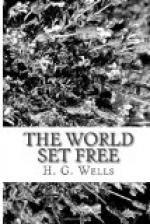The world had already been put upon one universal monetary basis. For some months after the accession of the council, the world’s affairs had been carried on without any sound currency at all. Over great regions money was still in use, but with the most extravagant variations in price and the most disconcerting fluctuations of public confidence. The ancient rarity of gold upon which the entire system rested was gone. Gold was now a waste product in the release of atomic energy, and it was plain that no metal could be the basis of the monetary system again. Henceforth all coins must be token coins. Yet the whole world was accustomed to metallic money, and a vast proportion of existing human relationships had grown up upon a cash basis, and were almost inconceivable without that convenient liquidating factor. It seemed absolutely necessary to the life of the social organisation to have some sort of currency, and the council had therefore to discover some real value upon which to rest it. Various such apparently stable values as land and hours of work were considered. Ultimately the government, which was now in possession of most of the supplies of energy-releasing material, fixed a certain number of units of energy as the value of a gold sovereign, declared a sovereign to be worth exactly twenty marks, twenty-five francs, five dollars, and so forth, with the other current units of the world, and undertook, under various qualifications and conditions, to deliver energy upon demand as payment for every sovereign presented. On the whole, this worked satisfactorily. They saved the face of the pound sterling. Coin was rehabilitated, and after a phase of price fluctuations, began to settle down to definite equivalents and uses again, with names and everyday values familiar to the common run of people....
Section 8
As the Brissago council came to realise that what it had supposed to be temporary camps of refugees were rapidly developing into great towns of a new type, and that it was remoulding the world in spite of itself, it decided to place this work of redistributing the non-agricultural population in the hands of a compactor and better qualified special committee. That committee is now, far more than the council of any other of its delegated committees, the active government of the world. Developed from an almost invisible germ of ‘town-planning’ that came obscurely into existence in Europe or America (the question is still in dispute) somewhere in the closing decades of the nineteenth century, its work, the continual active planning and replanning of the world as a place of human habitation, is now so to speak the collective material activity of the race. The spontaneous, disorderly spreadings and recessions of populations, as aimless and mechanical as the trickling of spilt water, which was the substance of history for endless years, giving rise here to congestions, here to chronic devastating wars, and everywhere to




